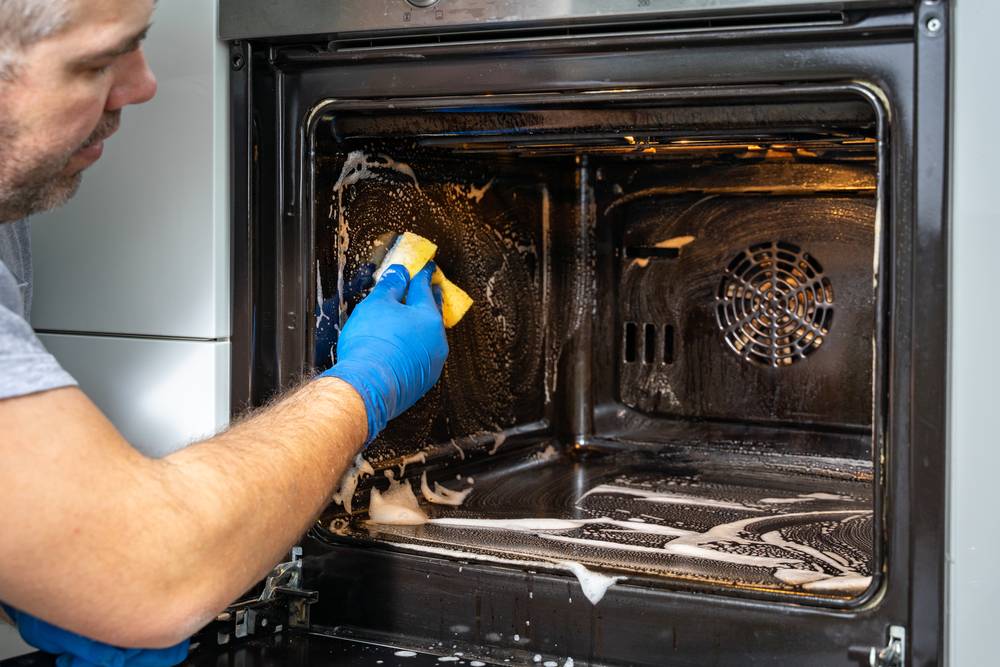Maintaining a clean oven is not just about keeping your kitchen looking neat; it's crucial for your health and safety. An unclean oven can harbor harmful bacteria, release unpleasant odors, and even pose fire risks. This comprehensive guide explores why regular oven cleaning is essential and provides actionable tips for keeping your oven in top shape.
The Importance of Regular Oven Cleaning
Health Implications of a Dirty Oven
A dirty oven can significantly impact your health. Food residue, grease, and spills left uncleaned can become breeding grounds for bacteria and mold. When you cook, these contaminants can be released into the air and into the food, potentially causing foodborne illnesses.
- Bacterial Growth: Grease and food particles provide an ideal environment for bacteria to thrive. Common pathogens, such as Salmonella and E. coli, can proliferate in the residues left behind in an unclean oven.
- Mold and Allergens: Moist environments, such as those created by spilled food, can encourage mold growth. Mold spores can become airborne, triggering allergies or respiratory issues.
Fire Safety Concerns
Regular oven cleaning is essential for fire safety. Accumulated grease and food debris are highly flammable and can pose a fire hazard.
- Grease Fires: Over time, grease can build up inside the oven, making it more susceptible to catching fire. A small flame or spark can ignite the grease, leading to a potentially dangerous fire.
- Smoke Production: An unclean oven can produce excess smoke, which can be harmful if inhaled and can also indicate a potential fire hazard.
How Often Should You Clean Your Oven?
Recommended Cleaning Frequency
The frequency of oven cleaning depends on how often you use your oven and what types of food you cook.
- For Frequent Users: If you use your oven frequently or cook greasy foods, it's advisable to clean it every few months. This helps prevent buildup and ensures a healthier cooking environment.
- For Light Users: If you use your oven occasionally and mainly for baking or roasting non-greasy foods, a deep clean every six months might be sufficient.
Signs That Your Oven Needs Cleaning
Pay attention to these signs that indicate your oven is due for a clean:
- Unpleasant Odors: Foul smells during cooking are often a sign of residue buildup.
- Excess Smoke: Smoke emanating from the oven when it's in use suggests a need for cleaning.
- Visible Buildup: Grease and food residue that are visibly accumulating on the oven's interior surfaces indicate it's time for a clean.
How to Clean Your Oven: Step-by-Step Guide
Preparing for Oven Cleaning
Before starting the cleaning process, gather the necessary supplies:
- Cleaning Solution: You can use a commercial oven cleaner or make a natural solution with baking soda and vinegar.
- Scrubbing Tools: Soft cloths, sponges, and non-abrasive scrubbers are ideal.
- Protective Gear: Wear gloves to protect your hands from harsh chemicals.
Cleaning the Oven Interior
- Remove Racks and Accessories: Take out the oven racks and any other removable parts. Clean these separately using warm, soapy water.
- Apply Cleaner: If using a commercial cleaner, follow the manufacturer's instructions. For a DIY solution, mix baking soda with water to form a paste and apply it to the interior surfaces.
- Let It Sit: Allow the cleaner to sit for the recommended time to break down grease and grime.
- Scrub and Wipe: Use a sponge or cloth to scrub the interior. Rinse and wipe down with clean water to remove residue.
Cleaning the Oven Door
- Remove Grime: Wipe down the glass with a damp cloth to remove any initial grime.
- Apply Cleaner: For stubborn stains, use a mixture of baking soda and water or a glass cleaner.
- Wipe Clean: Use a clean, dry cloth to buff the glass to a clear finish.
Tips for Maintaining a Clean Oven
- Wipe Spills Immediately: Clean up spills and splatters as soon as they occur to prevent them from hardening.
- Use Oven Liners: Consider using oven liners to catch drips and spills, making clean-up easier.
- Regular Inspections: Periodically check for signs of buildup and address them promptly.
The Benefits of Keeping Your Oven Clean
Improved Cooking Performance
A clean oven cooks more efficiently. Residual buildup can affect heat distribution, leading to uneven cooking. A clean oven ensures optimal performance and consistent results.
Enhanced Longevity
Regular maintenance extends the life of your oven. By preventing buildup and addressing issues early, you can avoid costly repairs or replacements.
Better Food Quality
Cooking in a clean oven ensures that your food is not tainted by old grease or residues, leading to better-tasting and healthier meals.
Conclusion
Regular oven cleaning is not just a matter of aesthetics but an essential practice for maintaining health and safety in your kitchen. By understanding the importance of oven cleanliness, following proper cleaning techniques, and adhering to a maintenance schedule, you can enjoy a safer, more efficient cooking environment and ensure the longevity of your appliance.





Comments